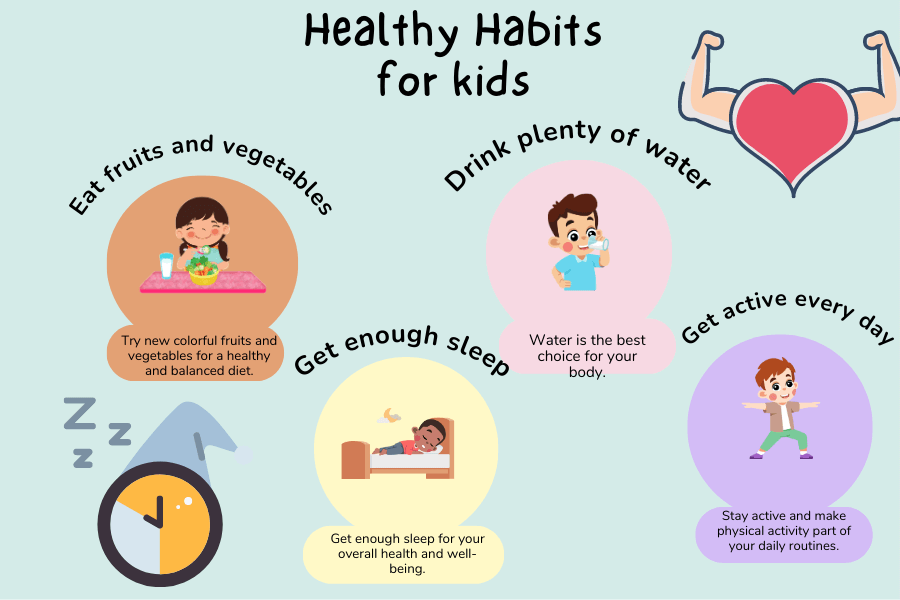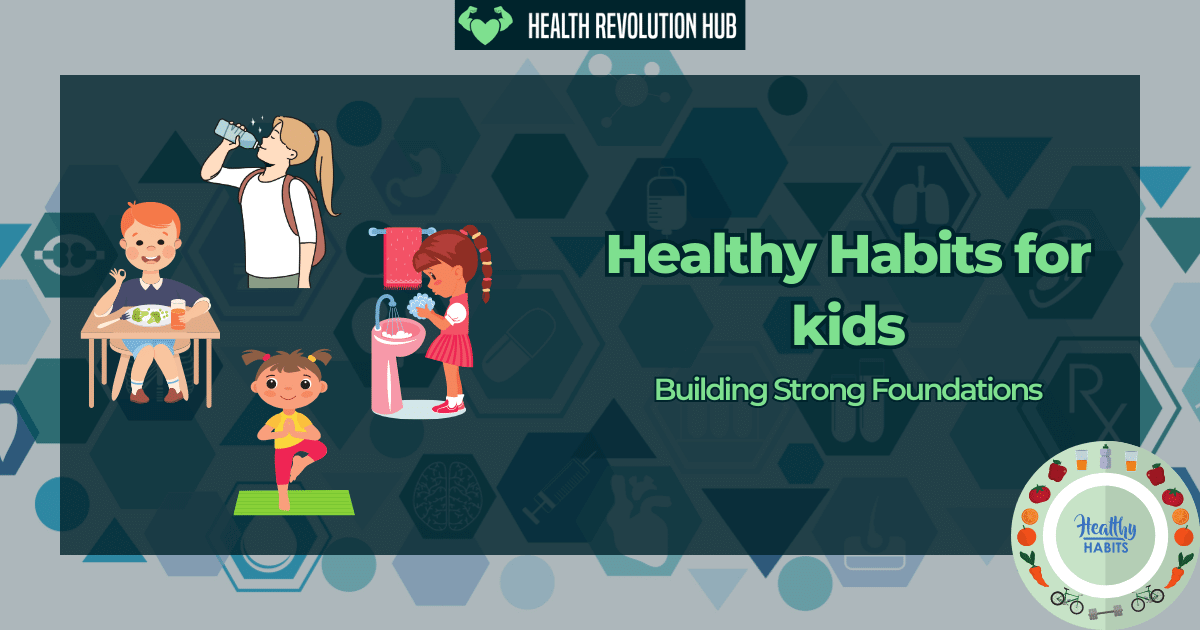Table of Contents
ToggleIntroduction to Healthy Habits for Kids
As parents, grandparents, caregivers, or babysitters, we all want the best for the children in our lives. We want to provide them with the tools and knowledge to grow up healthy and strong. One of the most important ways we can do this is by instilling healthy habits in their daily lives. These habits serve as the building blocks for a lifetime of well-being. In this blog post, we will explore some essential healthy habits for kids and how we can help them develop these habits from a young age.

1. Balanced Nutrition: Fueling Little Bodies
Good nutrition is the cornerstone of a healthy habits for kids. It is crucial to ensure that children receive a well-rounded diet that includes all the essential nutrients their growing bodies need. Encourage them to consume a variety of fruits, vegetables, whole grains, lean proteins, and low-fat dairy products.
Make mealtime a fun and interactive experience by involving children in meal planning, grocery shopping, and food preparation. This not only teaches them about healthy food choices but also fosters a sense of ownership and pride in what they eat.
2. Regular Physical Activity: The Joy of Movement

Physical activity is not only beneficial for a child’s physical health but also promotes the development of important motor skills and mental well-being. Encourage your children to engage in at least an hour of moderate to vigorous physical activity every day. This can include activities such as running, playing sports, dancing, swimming, or even taking family walks or bike rides.
Limit screen time and sedentary activities to ensure they get enough exercise. Remember, making physical activity enjoyable and incorporating it into their daily routine will help your child develop a lifelong love for fitness.
3. Sufficient Sleep: Recharging Growing Bodies
Adequate sleep plays a crucial role in a child’s growth and development. Establishing a consistent sleep routine is vital for their overall well-being. Younger children typically need more sleep, while older children should aim for 9-12 hours of sleep per night.
Create a calm and soothing bedtime routine, which may include reading a book, taking a warm bath, or listening to soft music. Ensure their sleep environment is comfortable, quiet, and free from distractions. By prioritizing sleep, you are setting your child up for success by enhancing their cognitive abilities, mood, and overall health.
4. Hydration: Quenching Thirst the Healthy Way

Water is essential for proper hydration, especially for growing bodies. Encourage your child to drink water throughout the day and make it easily accessible by having a water bottle or pitcher filled with water readily available.
Limit sugary drinks and opt for water as the primary beverage of choice. If your child is resistant to plain water, you can infuse it with slices of fruits like lemon or berries for a touch of flavor. Ensuring your child is well-hydrated promotes healthy digestion, enhances cognitive function, and supports overall well-being.
5. Hand Hygiene: Building a Healthy Barrier

Teaching children proper hand hygiene practices is crucial for preventing the spread of germs and illnesses. Encourage them to wash their hands thoroughly with soap and water for at least 20 seconds before and after meals, after using the restroom, and after playing outside.
Explain the importance of using hand sanitizer when soap and water are not readily available. As children learn these habits, they will be better equipped to protect themselves and others from harmful bacteria and viruses.
6. Emotional Well-being: Nurturing Little Hearts
Helping children develop emotional intelligence and resilience is essential for their overall well-being. Encourage open communication, validate their feelings, and teach them healthy ways to manage stress or disappointment. Foster a supportive and loving environment where they feel safe expressing themselves.
Encourage them to engage in activities they enjoy, such as hobbies, creative outlets, or spending time with loved ones. By nurturing their emotional well-being, you are equipping them with skills that will serve them throughout their lives.
Conclusion: A Journey of Good Habits
Building these healthy habits for kids is a journey that requires patience, consistency, and positive reinforcement. By introducing them to balanced nutrition, regular physical activity, sufficient sleep, proper hydration, hand hygiene, and emotional well-being, we are setting them on the path to a lifetime of well-being and fulfillment. As parents, grandparents, caregivers, or babysitters, we have the power to instill these healthy habits in their daily lives, shaping their future for the better. Let’s join hands and support the children in our lives to build strong foundations for a healthy and happy.
Related searches The Bountiful Health Benefits of Blueberries








